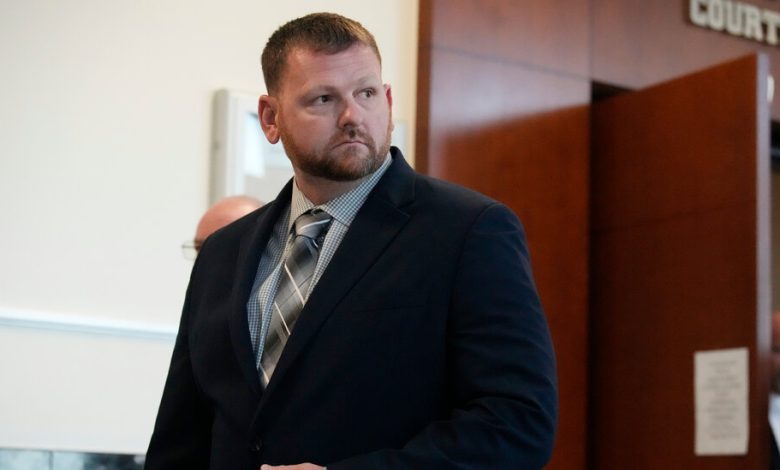Colorado Police Officer Sentenced to Jail in Elijah McClain Death

A Colorado police officer involved in the 2019 death of Elijah McClain, a young unarmed Black man whose case helped galvanize the police reform movement, was sentenced on Friday to 14 months in a county jail.
Randy Roedema, 41, an Aurora Police Department officer at the time, was convicted in October of criminally negligent homicide and third-degree assault for his role in Mr. McClain’s death. Mr. Roedema was one of three police officers prosecuted for the death and the only one convicted.
In August 2019, Mr. McClain, 23, was walking home from a convenience store in Aurora wearing a ski mask, which his mother said he wore because he had anemia and was often cold. Someone called 911, saying he “looked sketchy.” The police arrived and subdued Mr. McClain with a carotid chokehold. Paramedics injected him with an overdose of the powerful sedative ketamine. He died days later in the hospital.
In all, five men were prosecuted in Mr. McClain’s death. Mr. Roedema and two paramedics were convicted. Mr. Roedema, who had violently thrown Mr. McClain to the ground, is the first to be sentenced.
In an impassioned address to the court before the sentence was delivered, Mr. McClain’s mother, Sheneen McClain, said that Mr. Roedema had stolen her son’s life away and deserved to go to jail for it.
“Where was Randy Roedema’s humanity that night?” she asked.
Calling Mr. Roedema a “bully with a badge,” she said that it was clear to her that he “was not taught the valuable lessons of life’s purpose.”
In his own statement to the court, Mr. Roedema, a father of three who had served in the Marines, acknowledged that he could not imagine the “agony” that Mr. McClain’s family had endured. He said that he wished the night had gone differently, but that he had acted according to his training. His lawyers had asked for a sentence of probation.
Judge Mark Warner of Adams County District Court, who said he was “shocked” by Mr. McClain’s suffering once he was already in custody, sentenced Mr. Roedema to 14 months on the assault charge, with the possibility of work-release.
On the negligent homicide charge, a felony that has a maximum sentence of three years in prison, the judge ordered a sentence of four years probation, as well as 90 days in jail that would be served concurrently with the longer sentence.
Mr. Roedema’s lawyers said they planned to appeal his conviction.
In all, three Aurora Police Department officers and two Aurora Fire Rescue paramedics were charged with various counts of reckless manslaughter, criminally negligent homicide and assault in a case that became a cornerstone of the police accountability movement and deeply divided Aurora.
The defendants were tried in three separate trials, which yielded different outcomes. Jason Rosenblatt, an Aurora officer who was tried with Mr. Roedema, was acquitted of all charges. In November, Nathan Woodyard, the officer who first stopped Mr. McClain and placed a carotid hold on him, was also acquitted. Prosecutors argued that the chokehold triggered a downward cascade of health events that ultimately killed Mr. McClain.
The two paramedics, Jeremy Cooper and Peter Cichuniec, were found guilty of criminally negligent homicide in December. Mr. Cichuniec was also convicted of second-degree assault. They will be sentenced in March.
Law enforcement, emergency medical workers, lawyers and activists around the country were watching Friday’s proceeding closely as they believed it might reveal the judge’s inclinations about the case, hint at what the paramedics’ sentence might be, and reflect just how far the judicial system was willing to go to punish misconduct by public safety officers.
Activists viewed the sentencing as a critical piece of the justice equation, and some were disappointed that the sentence was not harsher.
Outside the court, Hashim Coates, a civil rights advocate, said that Mr. Roedema’s callous treatment of Mr. McClain had been on display for the world to see.
“It’s work-release, so he still gets to have Chick-fil-A five days a week, he still gets to go outside five days a week, he still gets to see his family five days a week,” Mr. Coates said. “That wasn’t a privilege afforded to Elijah or to his mother. She’ll never get to see Elijah again.”
Jim Pasco, executive director of the National Fraternal Order of Police, said Mr. McClain’s death was a horrible and irreversible tragedy. But, he added, “it appears that Officer Roedema didn’t act with criminal intent but made split-second decisions in the situation he confronted.”
“To the extent that those decisions have been found erroneous after the fact, he will now pay dearly for the rest of his life,” he said.
During the three trials, prosecutors argued that it was both the police’s violent subdual and the ketamine injected by the paramedics that killed Mr. McClain.
Body camera footage shown by prosecutors during the trial of Mr. Rosenblatt and Mr. Roedema showed Mr. Roedema violently throwing Mr. McClain to the ground and ignoring his pleas for help while he was drowning in his own vomit and struggling to breathe.
Defense attorneys argued that the officers’ use of force was justified because Mr. McClain had reached for Mr. Rosenblatt’s gun. They also shifted blame to the paramedics, who they said had medical control of the situation, failed to assess Mr. McClain and injected him with ketamine.
Adeel Hassan contributed reporting.




